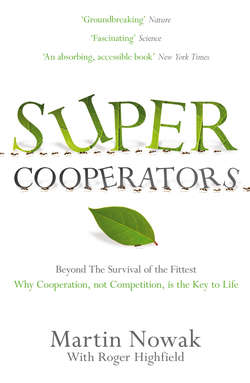Читать книгу SuperCooperators - Roger Highfield - Страница 32
На сайте Литреса книга снята с продажи.
STILL WALKING IN THE WIENERWALD
ОглавлениеWho steals my purse steals trash; ’tis something, nothing;
’Twas mine, ’tis his, and has been slave to thousands:
But he that filches from me my good name
Robs me of that which not enriches him
And makes me poor indeed.
—Shakespeare, Othello
During our hike in the Vienna woods, Karl and I had discovered another mechanism for the evolution of cooperation, one that relied on reputation. In direct reciprocity, all I can do is to learn from repeated encounters with the same person. As a result, my behavior depends on what you have done to me. But for indirect reciprocity, there are repeated interactions in a group. Now my behavior toward you also depends on what you have done to others.
This idea is now abundant in e-commerce, where there are many applications. The web abounds with ways to score the behavior of people, for example. Even when you encounter a stranger, you can benefit from someone else’s experience with him or her. Now, when buying a camera online, you consider the seller’s reputation as closely as the price. Subscribers to eBay auctions are asked to state, after every transaction, whether they were satisfied with their partner or not. Their partner’s score can accordingly increase or decrease by one point. The ratings of eBay members, accumulated over twelve months, are also public knowledge. This crude form of assessment seems to suffice for the purpose of reputation building and seems to be reasonable proof against being manipulated.
As a result, I can benefit from the experience of others when dealing with you by paying close attention to your reputation. If you have been unreliable, then I will be wary. However, if you have been generous, I am more likely to work with you. In this way indirect reciprocity is a powerful promoter of cooperation. David Haig, an evolutionary biologist at Harvard, sums this up elegantly: “For direct reciprocity you need a face. For indirect reciprocity you need a name.”
And for a name you need language, a convenient label to distinguish one person from another in the great game of life. Thus for indirect reciprocity to work, we need a way to communicate with each other, to discuss our hopes and our fears, and to learn from the experiences of others. I believe that the demand for social cooperation via indirect reciprocity has, more than anything else, propelled the evolution of human language. And to possess a faculty as complex as human language, you need an impressive brain. My stroll with Karl had taken us a long way from direct reciprocity to reveal a vast new panorama of cooperation.
